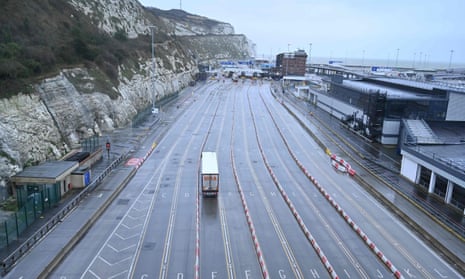Small businesses and manufacturers are bracing themselves for a fight for survival this year, according to fresh survey data, as they negotiate the twin threats of Covid-19 and weaker post-Brexit trade with the EU.
More than 250,000 small firms expect to fold without further government financial support, according to a quarterly poll by the Federation of Small Businesses (FSB).
Manufacturers’ trade body Make UK said its members expected lower investment in the UK and to have a harder time recruiting talent.
Just under 5% of the 1,400 companies surveyed by the FSB said they were expecting to close down this year, the largest proportion in the history of the trade body’s Small Business Index, established in the wake of the 2008 banking crash.
If the same degree of pessimism applies across the UK’s 5.9m small businesses, that would suggest as many as 295,000 fear they will go under.
The vast majority of firms surveyed, 80%, did not expect their prospects to improve over the next three months, with tough lockdown restrictions likely to stay in place.
Close to a quarter had cut staff over the last three months, while one in seven expected to do so between now and the end of March, raising a question mark over the futures of 16.8 million people who work for small businesses.
The FSB’s national chair, Mike Cherry, said the amount of government support available had dwindled as the pandemic raged on.
“At the outset of the first national lockdown, the UK government was bold,” he said. “The support mechanisms put in place weren’t perfect, but they were an exceptionally good starting point. That’s why it’s so disappointing that it’s met this lockdown with a whimper.”
He welcomed support for retail, leisure and hospitality businesses but said that many were “still being left out in the cold”, including company directors, the newly self-employed, supply chains and firms without commercial premises.
The FSB published a five-point plan to assist small businesses, including grants, income support and extended debt relief.
But it warned that firms already lacked the cash to cope with the tough trading environment, particularly given the costs associated with adjusting to the UK’s new trading relationship with the EU.
Almost half of the FSB’s members expect international sales to fall, up from 33% last year.
And survey data from Make UK, in partnership with accounting firm PwC, indicates that its members feel the same way about the post-Brexit challenge.
A third of companies said they expected investment prospects for UK businesses to decrease following the departure from the EU, with just 18% of companies believing they will improve.
Just over a quarter believed exports to the EU would fall with just 16% believing they would increase, while a third believed the UK’s ability to attract international talent would fall.
Customs delays, cited by 47% of firms, are seen as the biggest risk to companies while concerns over national and local lockdowns were the second biggest risk at 46%.
Make UK’s chief executive, Stephen Phipson, said: “The transition to new trading arrangements with the EU was always going to be the biggest challenge facing manufacturers this year and the fact we have an agreement in place doesn’t alter that.”
He called for a bold industrial strategy that goes beyond “short-term tinkering”, instead laying out a plan for the next decade.
As firms voiced their concern about the future, an index tracking business output fell to its lowest ever level, below even the post-banking crash recession.
The BDO Output Index, which measures economic data from the UK’s main business surveys, averaged 73.62 in 2020, well below the previous low of 83.28, recorded in 2009.
“These figures reinforce just how stark the economic impact of the pandemic has been,” said BDO partner Kaley Crossthwaite.
“As we enter a third national lockdown, crippling challenges will continue to plague businesses in the weeks and months ahead.
“Successful and rapid rollout of Covid-19 vaccines will be the single biggest driver of business recovery.”
